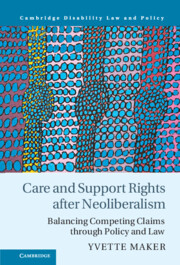
-
Select format
-
- Publisher:
- Cambridge University Press
- Publication date:
- 21 April 2022
- 28 April 2022
- ISBN:
- 9781108750479
- 9781108485203
- Dimensions:
- (229 x 152 mm)
- Weight & Pages:
- 0.63kg, 328 Pages
- Dimensions:
- Weight & Pages:
You may already have access via personal or institutional login
Book description
This book offers principles for designing care and support policy to address two persistent sources of tension in the field. The first is the tension between supporting women's unpaid caring and supporting their paid work participation. The second is the tension between carers' claims for support based on the 'burden' of caring and disability rights claims for support for choice and independence for people with disabilities. Policies tend to favor one activity and one constituency over the other. Consequently, individuals' access to resources and choices about how they live are constrained. Using a citizenship rights framework, with insights from human rights law, the principles provide guidance for designing policy and legislation that avoids 'either/or' approaches and addresses the interests of multiple constituencies. Analyses of Australian and English policies demonstrate the value of the principles for developing policy that reduces inequality, responds to 'failures' of neoliberalism, and expands choice for all.
Reviews
‘The fundamental social problem that the book attempts to address is marginalization of those who require care and/or provide care in 'liberal welfare states''
Poland Lai Source: Canadian Journal of Law and Society/La Revue Canadienne Droit et Société
Contents
Metrics
Altmetric attention score
Full text views
Full text views help Loading metrics...
Loading metrics...
* Views captured on Cambridge Core between #date#. This data will be updated every 24 hours.
Usage data cannot currently be displayed.
Accessibility standard: Unknown
Why this information is here
This section outlines the accessibility features of this content - including support for screen readers, full keyboard navigation and high-contrast display options. This may not be relevant for you.
Accessibility Information
Accessibility compliance for the PDF of this book is currently unknown and may be updated in the future.


